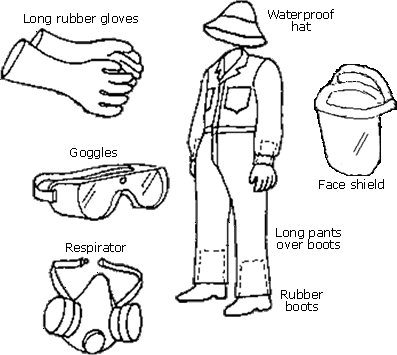Tsunami Worker Fact Sheet: Pesticide Safety Guidance for Mixers, Loaders, and Applicators
If used improperly, pesticides can cause serious disease or death. This fact sheet provides simple guidance on the safe use of pesticides for mixers, loaders, and applicators.
MIX, LOAD, AND APPLY PESTICIDES PROPERLY. Before mixing or using pesticides, READ THE LABEL. Use protective clothing (described below). Mix the pesticides outdoors where there is good ventilation. Always shower or bathe after using pesticides. If you splash or spill a pesticide on yourself, STOP IMMEDIATELY! Remove your contaminated clothing and wash yourself and the clothing, separate from family clothing, with soapy water. If pesticide gets in your eyes, flush your eyes with water for at least 15 minutes. Check the equipment for leaking hoses or connections and for plugged or worn nozzles. Clear all livestock, pets, and people from the area to be treated. Mix the pesticide at the recommended concentration and apply it at the specified rate and dosage.
WEAR PROTECTIVE CLOTHING.  Pesticides can enter the body through the skin, the eyes, the mouth, and the lungs. Protective clothing (including coveralls, apron, broad-rimmed waterproof hat, boots, rubber gloves, goggles or face shields, and respirators) provides protection against pesticide exposures. The pesticide label should tell you what protective equipment is necessary. Wear it!
Pesticides can enter the body through the skin, the eyes, the mouth, and the lungs. Protective clothing (including coveralls, apron, broad-rimmed waterproof hat, boots, rubber gloves, goggles or face shields, and respirators) provides protection against pesticide exposures. The pesticide label should tell you what protective equipment is necessary. Wear it!
DON'T EAT, DRINK OR SMOKE AROUND PESTICIDES. Be careful not to wipe your face with your shirt sleeves. This could put the pesticide directly onto your bare skin. Wash your hands before eating, drinking, chewing gum, using tobacco, or using the toilet.
IF YOU BECOME ILL while working with pesticides, stop work immediately and seek fresh air. Notify your supervisor or a fellow employee that you are ill and you may need to seek medical attention. Symptoms may include irritation of the skin, eyes, or respiratory tract; headache; nausea; dizziness; and blurred vision.
STORE PESTICIDES PROPERLY. Pesticides should be stored in a properly labeled container with the label clearly visible and should be kept in a locked storage area. Never store pesticides in old bottles or food containers where they could be mistaken for food or drink for people or animals. Never store pesticides near food, feed, or seed. If possible, pesticides should also be stored in a cool and dry location.
DISPOSE OF PESTICIDES PROPERLY. Leftover pesticide can be disposed of in an approved landfill designed to handle pesticide disposal. Triple-rinsed empty pesticide containers can usually be disposed of in landfills with household trash. Pesticides should not be disposed of where they may enter water used for drinking or washing, fish ponds, or rivers. Do not reuse the original containers for any purpose, especially NOT as drinking water containers.
- Page last reviewed: February 8, 2013
- Page last updated: January 21, 2005
- Content source:


 ShareCompartir
ShareCompartir

